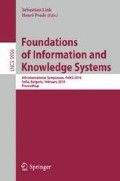Abstract
A fundamental requirement of collaborative dialogue formal systems is ensuring both that all the relevant information will be exposed and also irrelevancies will be avoided. The challenge is to fulfill this requirement in the context of a distributed MAS where each agent is unaware of the private knowledge of the others. We argue that it is possible to give a general treatment to this problem in terms of relevance notions, and propose a partial solution which reduces the problem to that of finding adequate potential relevance notions. Specifically, we present in this work an Abstract Dialogue Framework which provides an environment for studying the behavior of collaborative dialogue systems in terms of abstract relevance notions, together with three Collaborative Semantics each of which defines a different collaborative behavior of the dialogues under the framework. One of these semantics describes an utopian, non practical, behavior which is approximated in different ways by the other two constructive semantics. Complete examples are provided in Propositional Logic Programming.
This research is partially supported by Sec. Gral. de Ciencia y Tecnología (Univ. Nac. del Sur), CONICET and Agencia Nac. de Prom. Científica y Técnica (ANPCyT).
Access this chapter
Tax calculation will be finalised at checkout
Purchases are for personal use only
Preview
Unable to display preview. Download preview PDF.
References
Kraus, S., Sycara, K., Evenchik, A.: Reaching agreements through argumentation: A logical model and implementation. Artificial Intelligence (1998)
Parsons, S., Amgoud, L., Wooldridge, M.: An analysis of formal inter-agent dialogues. In: AAMAS 2002, Bologna, Italy (2002)
Amgoud, L., Prade, H., Belabbes, S.: Towards a formal framework for the search of a consensus between autonomous agents. In: AAMAS 2005, Utrecht (2005)
Amgoud, L., Dimopoulos, Y., Moraitis, P.: A unified and general framework for argumentation based negotiation. In: AAMAS 2007, Honolulu, Hawai’i (2007)
Black, E., Hunter, A.: A generative inquiry dialogue system. In: AAMAS 2007, Honolulu, Hawai’i (2007)
Marcos, M.J., Falappa, M.A., Simari, G.R.: A set of collaborative semantics for an abstract dialogue framework. In: The 6th IJCAI Workshop on Knowledge and Reasoning in Practical Dialogue Systems (KRPD 2009), Pasadena, California, USA (2009)
Walton, D., Krabbe, E.: Commitment in Dialogue: Basic Concepts of Interpersonal Reasoning. State University of New York Press, Albany (1995)
Makinson, D.: General patterns in nonmonotonic reasoning. In: Handbook of Logic in Artificial Intelligence and Logic Programming (1994)
Prakken, H.: Coherence and flexibility in dialogue games for argumentation. J. Log. Comput. (2005)
Parsons, S., McBurney, P., Sklar, E., Wooldridge, M.: On the relevance of utterances in formal inter-agent dialogues. In: AAMAS 2007, Honolulu, Hawai’i (2007)
Kakas, A.C., Kowalski, R.A., Toni, F.: Abductive logic programming. J. Log. Comput. (1992)
Prakken, H.: On dialogue systems with speech acts, arguments, and counterarguments. In: Brewka, G., Moniz Pereira, L., Ojeda-Aciego, M., de Guzmán, I.P. (eds.) JELIA 2000. LNCS (LNAI), vol. 1919, p. 224. Springer, Heidelberg (2000)
Prakken, H.: Relating protocols for dynamic dispute with logics for defeasible argumentation. Synthese (2001)
García, A.J., Simari, G.R.: Defeasible logic programming: An argumentative aproach. Theory and Practice of Logic Programming 4(1), 95–138 (2004)
Amgoud, L., de Saint-Cyr, F.D.: Measures for persuasion dialogs: A preliminary investigation. In: COMMA 2008, Toulouse, France (2008)
Author information
Authors and Affiliations
Editor information
Editors and Affiliations
Rights and permissions
Copyright information
© 2010 Springer-Verlag Berlin Heidelberg
About this paper
Cite this paper
Marcos, M.J., Falappa, M.A., Simari, G.R. (2010). Semantically Characterizing Collaborative Behavior in an Abstract Dialogue Framework. In: Link, S., Prade, H. (eds) Foundations of Information and Knowledge Systems. FoIKS 2010. Lecture Notes in Computer Science, vol 5956. Springer, Berlin, Heidelberg. https://doi.org/10.1007/978-3-642-11829-6_13
Download citation
DOI: https://doi.org/10.1007/978-3-642-11829-6_13
Publisher Name: Springer, Berlin, Heidelberg
Print ISBN: 978-3-642-11828-9
Online ISBN: 978-3-642-11829-6
eBook Packages: Computer ScienceComputer Science (R0)

